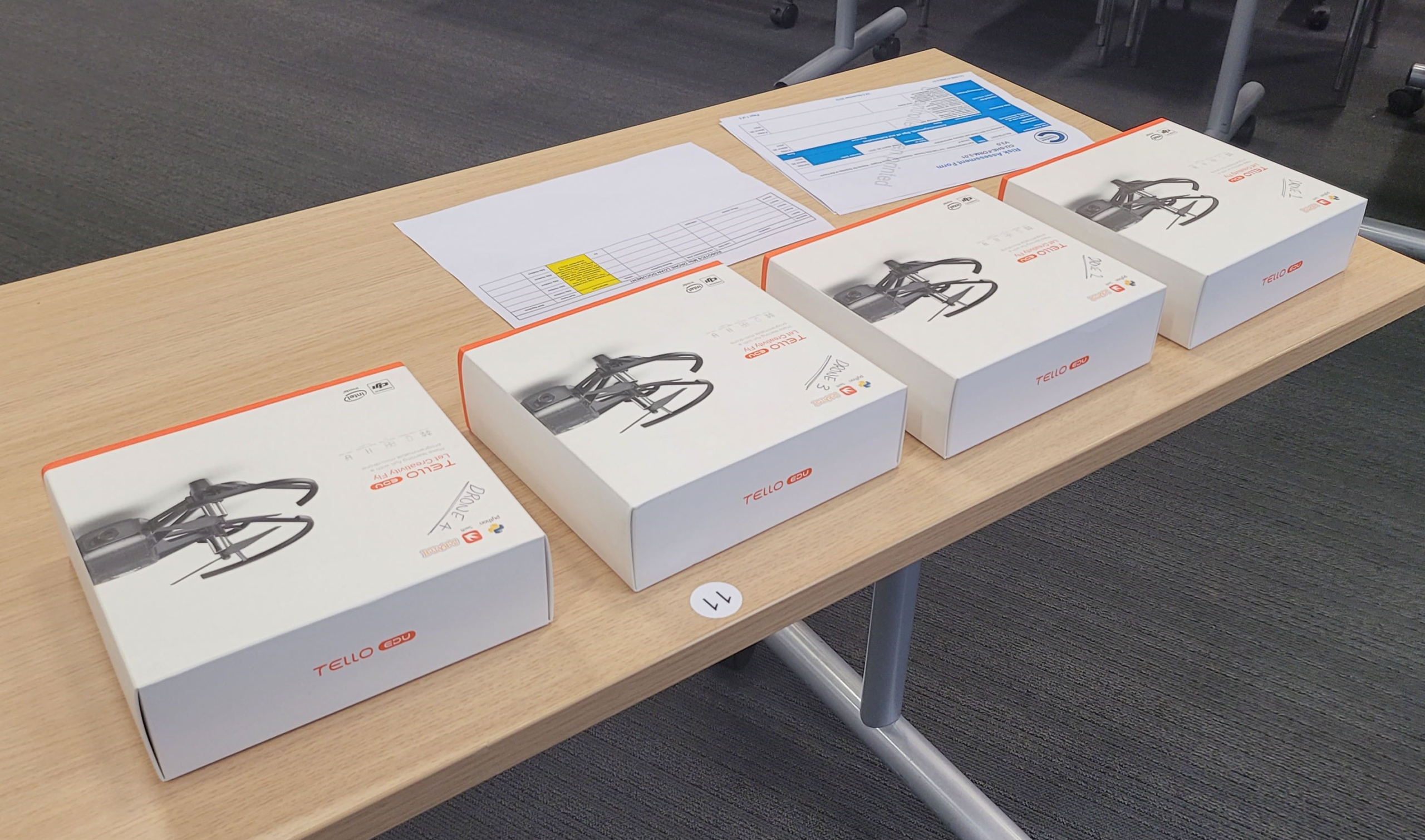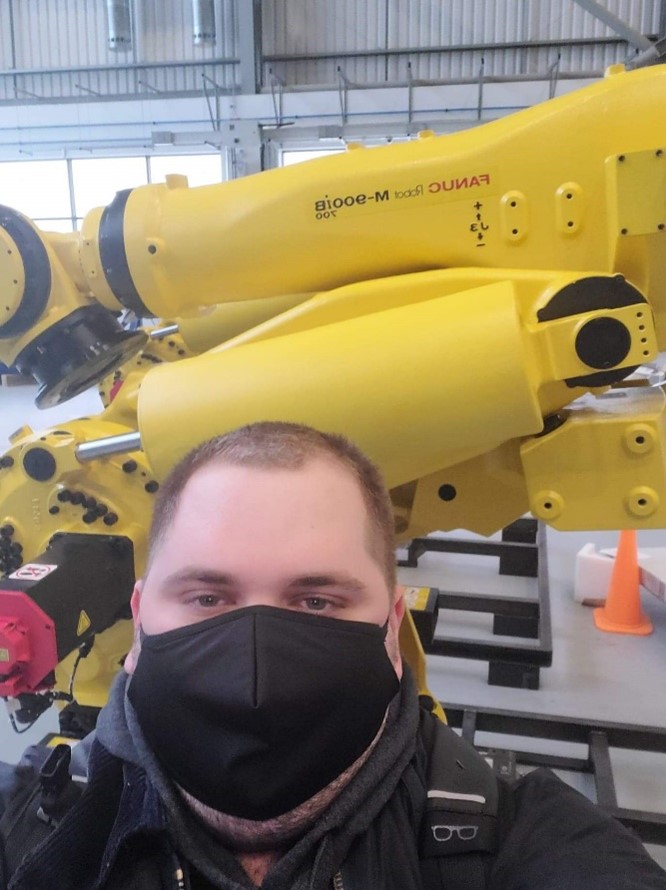My Cranfield MSc: Robotics MSc – my experience so far
29/03/2021

Hello! My name is Angelos Dimakos, and I am from Greece. I am currently studying for an MSc in Robotics at Cranfield University. I am also the Course Representative for this course.

Initially, I heard about Cranfield University from a co-worker, who was the robotics engineer for a marine workshop. He was responsible for using MIG welding for some important operations. I was in the quality control department but seeing robots at work welding fascinated me. Furthermore, during my certification as a welding engineer, the limitations of manual welding, as well as the capabilities of automated manufacturing motivated me to apply.
The Robotics MSc is a relatively new course at Cranfield, so I would like to provide you with some information regarding the modules, to help you make an informed decision and see if this MSc is suitable for you.
The course consists of eight modules, which are divided into distinct categories:
- Fundamentals of Robotics is mainly an introduction to the field and how intelligent automation interacts with humans.
- Robotics Control, Autonomy in Robotic Systems, and Artificial Intelligence and Machine Learning for Robotics mostly describe some general information about robotic manipulators, the application of computational learning, and mobile robots’ underlying background.
- Programming Methods for Robotics and Machine Vision for Robotics describe some fundamental programming paradigms and some operations on images using OpenCV.
- Finally, Psychology, Ethics, and Standards addresses intelligent automation’s impact on humans and ethical dilemmas.
An easy conclusion one might make is that robotics is a vast field. From a mechanical point of view, the correct configuration of a cell is essential. From an electrical point of view, the control of robotic systems remains an open challenge. Furthermore, the perception, decision-making, and cognition of automated systems requires good knowledge of sensor technology, machine vision, and machine learning. Finally, the perception of humans regarding robots is essential to the acceptance and adoption of different technology.
Due to the reasons above, the course is intense and requires effort and focus. A sound robotics engineer needs to have a good mastery of some of the most complex topics in science. As such, a project-oriented learning approach is essential to research, apply and understand these various fields.
A result of that is that the course is assessed based on assignments, with seven of them based on individual coursework. The assignment on Fundamentals of Robotics was the group project for the taught part of the course. The assessment procedure has been affected by the pandemic, and the experience might vary in the future. The group project was overly exciting, as we were responsible for the simulation of various important manufacturing processes. The technical analysis of available equipment, the design of appropriate tools and the simulation of efficient processes are skills that are in big demand, and some that our first assignment helped us develop.

The assignments were interesting and helped me develop both knowledge and valuable soft skills. The group project for the Fundamentals of Robotics presented different challenges. One of the biggest obstacles is teamwork. Differing opinions, the language barrier, and the responsibility to produce quality work in a tight deadline necessitated the development of good time management skills and enhanced my ability to work as part of a team with different skills. Furthermore, I gained valuable experience in the simulation of various processes with the use of RobotStudio.
The Robotics Control assignment had even higher expectations, and a different host of problems. It forced the whole cohort to help and motivate each other. The development of the underlying equations for the design of manipulators was a remarkably interesting topic, as it presented limitations even in the simulation, and created an interest in the control of nonlinear systems. Furthermore, the lectures were extremely helpful in addressing this wide subject and gave us invaluable information about the calibration of robots.
A remarkably interesting aspect of lectures was those that participated, as well as the content. In the Robotics Control, we had a lecture on the calibration of robotic manipulators. An interesting and especially important topic for future intelligent automation, as flexibility of automation should not be a trade-off for accuracy. Instead, using metrology to validate the accuracy of articulated robots is very important! Furthermore, we received lectures from Dr Marco Chacin, the Principal Robotics Engineer at Airbus. His input was invaluable, as he was focused on the challenges and limitations in robotics, and how even the most sophisticated research is limited in addressing some basic tasks, such as opening a door.

The Programming Methods assignment highlighted the importance of good programming practices, and the development of well documented and robust code. It was mostly focused on the implementation of different languages, C and C++, which are especially important in the development of reliable and efficient software. The lectures were also based on practical sessions, because as one lecturer pointed out, “the only way to learn programming is to code”.
The next modules were structured in a similar fashion. The lectures were about the theoretical background for different fields of robotics and were complemented by practical sessions. The assignments then enabled us to apply that knowledge and learn more about the challenges in the implementation of that knowledge.
An especially important aspect was that the course gave me a lot of freedom to pursue and develop my own research interests and become more critical of existing technology and research.
The takeaway from this course would be that constant research and interest in this field, and the applying that knowledge, is imperative. It is also especially important to have good teachers, willing to help you foster that interest, and challenge your ideas.
Thank you for reading this blog!
Please check back for my next blog which will cover my group project experience.
To learn more about Robotics MSc please visit:
Categories & Tags:
Leave a comment on this post:
You might also like…
Company codes – CUSIP, SEDOL, ISIN…. What do they mean and how can you use them in our Library resources?
As you use our many finance resources, you will probably notice unique company identifiers which may be codes or symbols. It is worth spending some time getting to know what these are and which resources ...
Supporting careers in defence through specialist education
As a materials engineer by background, I have always been drawn to fields where technical expertise directly shapes real‑world outcomes. Few sectors exemplify this better than defence. Engineering careers in defence sit at the ...
What being a woman in STEM means to me
STEM is both a way of thinking and a practical toolkit. It sharpens reasoning and equips us to turn ideas into solutions with measurable impact. For me, STEM has never been only about acquiring ...
A woman’s experience in environmental science within defence
When I stepped into the gates of the Defence Academy it was the 30th September 2019. I did not know at the time that this would be the beginning of a long journey as ...
Working on your group project? We can help!
When undertaking a group project, typically you'll need to investigate a topic, decide on a methodology for your investigation, gather and collate information and data, share your findings with each other, and then formally report ...
From passion to purpose: My journey at the Pinnacle of Aviation
By: Sultana Yassin Abdi MSc Air Transport Management, Current Student Born and raised in the vibrant landscape of the UAE, with roots stretching back to Somalia, my life has always been ...






